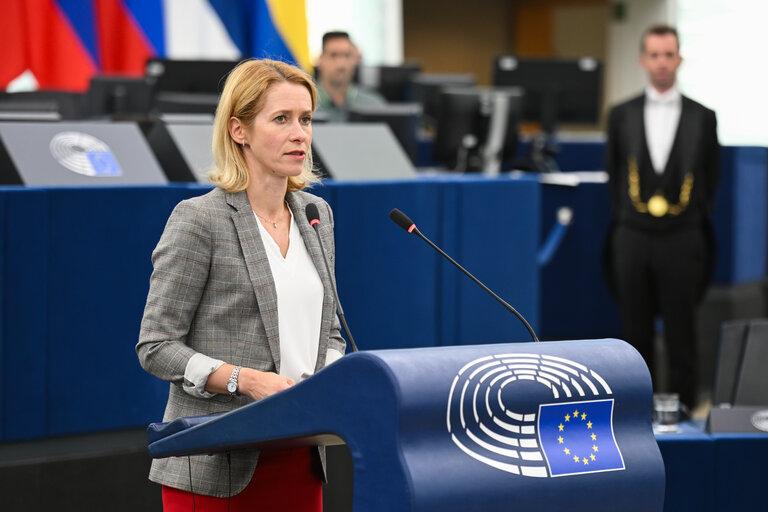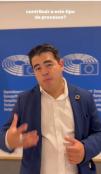Speech by High Representative/Vice-President Kaja Kallas at the EP Plenary Session Joint Debate on the situation in the Middle East (European Parliament title)

Dear President,
Honourable Members of the European Parliament,
Israel and Iran have exchanged attacks for five days now.
The escalation we see is extremely dangerous for many reasons, including civilian casualties and the risk of radioactive spillage.
The impact of the crisis on global energy markets is also a risk. The conflict has already triggered the largest oil price surge in in a single day in three years. As President von der Leyen said, the EU stands ready to coordinate with partners to protect market stability.
This morning I chaired an extraordinary Foreign Affairs Council to discuss the situation in the Middle East, including Iran.
Ministers called on all sides to abide by international law, exercise restraint, and avoid actions that could spiral out of control.
Iran is still the main source of regional instability. It is one of the most repressive regimes in the world.
The EU has always maintained that Iran must never be allowed to acquire a nuclear weapon.
Last week, and for the first time in 20 years, the International Atomic Energy Agency declared Iran in breach of its non-proliferation obligations.
Israel’s attacks, while they may have set Iran’s nuclear programme back, cannot so easily erase Iran’s know-how, technology or intentions.
Diplomacy will always be the best way to address Iran’s nuclear programme in the long-run. And Europe stands ready to play its part in brokering a deal.
With regards to the immediate fall-out of the conflict, we discussed what the EU can offer in terms of practical support now.
We have activated civil protection mechanisms and are working closely with Member States to assist their citizens who wish to leave the region.
We have offered to deploy civil protection experts to assist with potential water decontamination efforts.
And our naval operation ASPIDES continues to protect merchant ships from Houthi attacks, while providing valuable situational awareness.
Dear President,
Honourable Members,
What was also clear from today’s meeting is that we will not let this new crisis overshadow what is happening in Gaza.
We are now 20 months into a conflict triggered by the horrific attacks of Hamas.
Israel has a right to defend itself. And Hamas should immediately release the remaining hostages. But Israel’s use of force in Gaza, the continuing deaths of civilians, and the targeting of civilian infrastructure go beyond self-defence.
Israel’s actions cannot be justified under humanitarian and international law.
At the last Foreign Affairs Council in May, it was clear that a majority of Member States were in favour of opening a review of Israel’s compliance with Article 2 of our Association Agreement.
Article 2 imposes binding obligations on the parties to observe human rights.
This review is now underway and I will present the outcome to the Foreign Ministers on Monday.
At the same time, the EU continues to work on all fronts to provide support to the Palestinian people:
-
We are still the largest international donor by far.
-
Our humanitarian funding for this year alone is 170 million euro.
-
And since October 2023, the EU has helped transport close to five thousand tonnes of humanitarian cargo into Gaza.
I have repeatedly spoken to the Israeli Foreign Minister with a plea to allow aid into Gaza without interruption and to resume the ceasefire. The answer to aid being weaponised is not to block it but to flood the region with so much it cannot be misused. And there is more than enough to do this.
But the humanitarian situation is still deteriorating. Three warehouses were recently open in Gaza, but only one is now accepting new deliveries.
The world is desperate to help. The amount of aid is not the problem. The access is.
Honourable Members,
The Middle East is burning. Military aggression is unrelenting. And the anger seems to be unstoppable.
The short-term consequences of fire between Israel and Iran could delay Iran’s nuclear efforts. But there is no certainty that Israel will get what it seeks in this way.
Likewise in Gaza, it is perfectly clear for all to see that military means will not provide the solace that the Israeli people are looking for.
It has not resulted in the liberation of hostages. And it has now endangered the entire population of Gaza, causing unjustified human suffering.
The European Union must do everything we can to push for diplomacy, meet humanitarian needs where we can, and stand up for the values we were built on.
Thank you.
Closing remarks
Do you think that it is not painful for me to see the suffering of the Palestinian people? Really, do you really think that it’s true?
That is why I'm talking almost every day to the Minister of Israel that the humanitarian aid would get in, that the human suffering will stop and that they would not weaponise humanitarian aid, because the suffering of people is happening. And I'm asking all the time, all the time, have we done enough to stop this? And clearly we haven't, because this is still going on. And I have equally the same frustration as you do.
What I don't agree with is that we have been silent. We have not been silent. The EU has never been silent in the face of the war and this tragedy. We have consistently passed very strong messages. And I can assure you that I will continue to do this, also in the in the future.
I've had exactly the same positions on humanitarian law and international law, regarding Gaza, regarding Ukraine. I also addressed these issues in my speech today. You were not in the plenary, but I addressed this. I have exactly the same positions, so this is equally frustrating for us.
The decision to carry out the review of Israel's compliance with the human rights obligations sends a clear message to Israel that the EU's commitment to human rights and international law are not just words.
Now to the Association Agreement, as I said, the review is being conducted. And then, of course, it's the question, what do we do about this?
In the Council, we have the unanimity. We have to have 27 countries on board. And that's why we know you, we know here, listening to different speeches, that you have very different views in different Member States. And yes, there are some measures that are QMV, but that needs to be proposed by the College. And especially, I would say to the former College member, I mean, you were a member of the College, and you know that in College, you also have unanimity. So this has been going on for quite some time when you were also a member of the College. So also the question, why didn't you do anything if it is so easy? But it is not easy, that is, that is the problem.
On the suspension of the agreement, would it stop the killing? If we don't have the agreement? You know the answer to this question, it will not stop the killing, but it will close the channels to talk to Israel and press on the humanitarian aid reaching the people. And of course, I can propose measures that I know will not go through, not in College, not in Council. So I would certainly feel much better saying that I've done enough, because I propose this, but I know it will not go through and I'm sure you expressing your anger at me here, you also feel better that you have done something, but it's not enough, and that is the frustration, equal frustration that I have, that you have too.
So I'm trying to do my job, but I'm not you know, we are not a European Union where one person makes decisions. We are not an institution like this. We have 27 in the College, and we have also in the Commission, 27 that need to be on board. So that is the situation right now. I mean, we are trying to do everything to really help the Palestinian people. We are the biggest donor of help and humanitarian aid. The issue is the access, and that's why we are raising this issue all the time with our Israeli counterparts to let the humanitarian aid in to help the people. Because the amount is not the problem. The access is.
So we are trying to do our best, and of course, we need also all of your support to do that, but it's very hard, as you can hear also here in the in the plenary. There are very different views from different political groups, but also from different countries, and this is equally represented in the College and in the Council.
Thank you.




